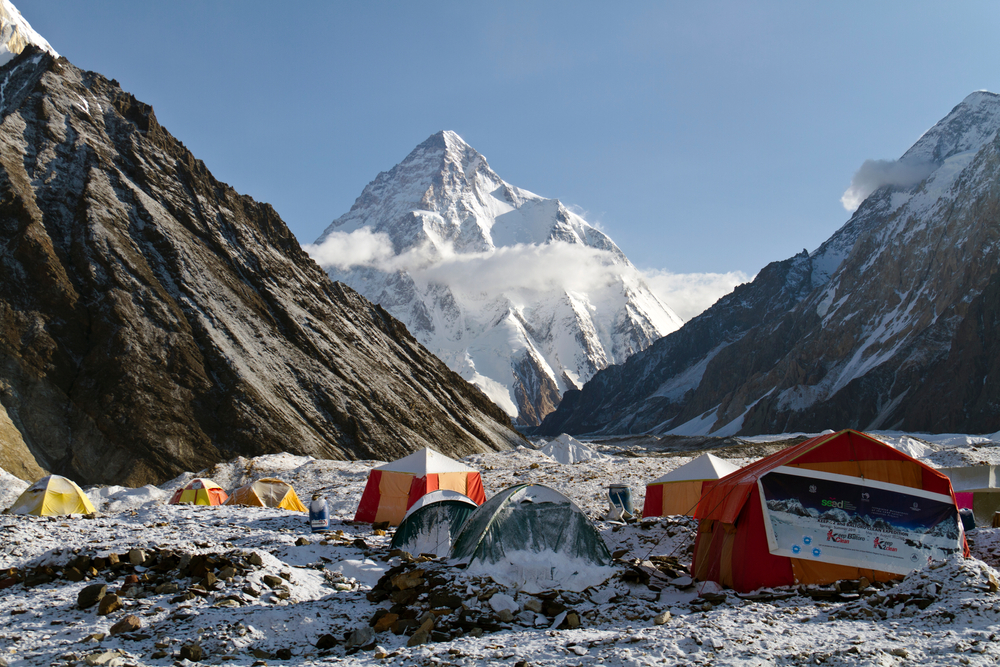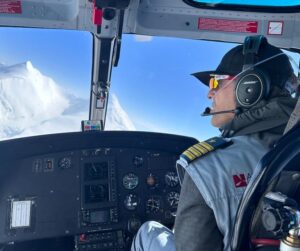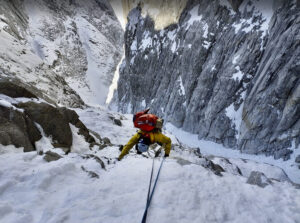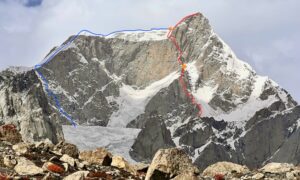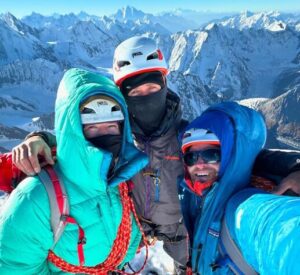A Pakistani porter died in Concordia yesterday after 16 hours of waiting in vain to be evacuated. Ser Muhammad was carrying loads for a K2 expedition. At around 5,000m, before Base Camp, he fell sick with symptoms of Acute Mountain Sickness.
In an interview with the news site Hum.com, the Pakistan Association of Tour Operators (PATO) said Muhammad was given initial treatment by an on-site medical team. When he didn’t improve, they requested an aerial evacuation. And here comes the problem.
“Typically, porters do not have the same insurance coverage as foreign climbers, and we appealed on humanitarian grounds,” PATO Secretary Muhammad Umar said. “The army approved the request, but due to bad weather, the helicopter could not [get there] in time.”
Sadly, Ser Muhammad died the following morning, still in a tent in Concordia.
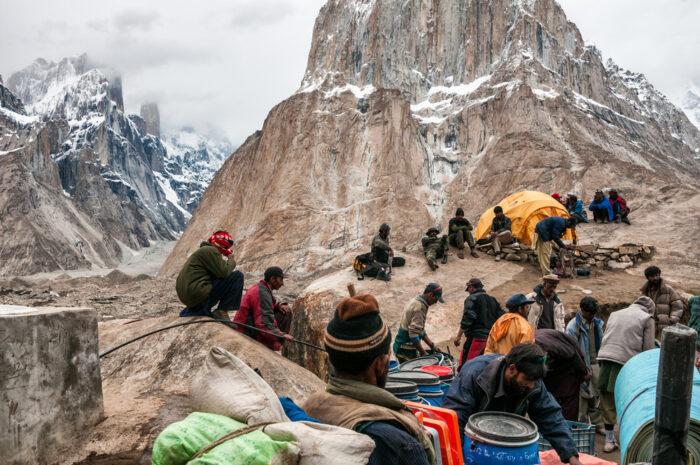
Porters at Urdukas camp during the Baltoro trek. Photo: Shutterstock
The military pilots of Askari Aviation exclusively provide helicopter services in Pakistan. They usually charge around $20,000 per flight. Foreign climbers and perhaps some privileged locals may pay enough for an insurance policy to cover that expense, but most local mountain workers can’t, least of all the porters who carry loads to Base Camp.
These are not even hired for the season but are paid by the day, according to rates established by the Gilgit Baltistan government:
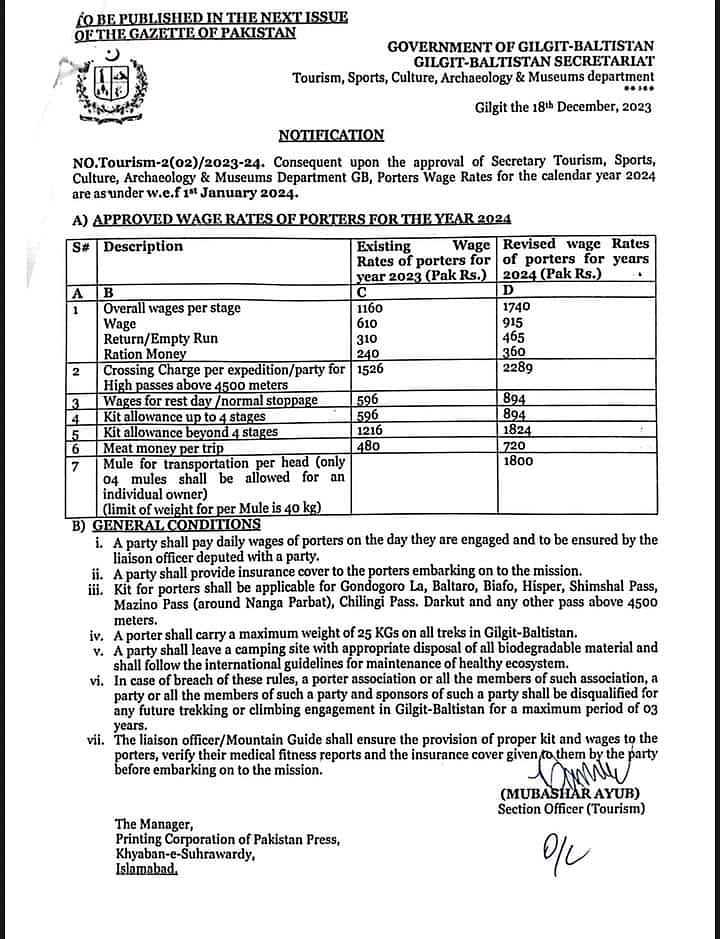
Rates for porters in Pakistan in 2024. 1,740 Pakistani rupees is about $6. Document shared by Hum.com
Local insurance not enough
Umar added that the Gilgit-Baltistan government does give local porters some insurance, but it only covers up to the equivalent of $718, which is well short of any rescue cost.
News of Ser Muhammad’s death has prompted renewed calls for improvements in working conditions and infrastructure for local workers.
As blogger Pir Faraz Ali said on social media, there is no proper rescue service in Pakistan’s mountains, and the nearest hospital (to Concordia) is three to four days away on muleback.
“We need a heli rescue service that is also affordable for these local porters,” wrote Faraz Ali. “[They] wait all year round for the climbing season to make money to feed their families and then lose their lives to this.”
He also criticized the Alpine Club of Pakistan, which he considers toothless. He calls for leaders “who actually do something for local climbers and porters.”
“The government of Gilgit-Baltistan and the tourism department should take immediate action to address these issues,” agrees Umar of PATO.
Ali Porik, the vice president at PATO, confirmed to ExplorersWeb that the pilots agreed to rescue the porter, but he died before they could fly to the place. Fellow porters are currently transporting Muhammad’s body by mule to his home village of Tisar.
“PATO has appealed for donations for the porter’s family,” Porik said. “The insurance money is not enough and will require a long process until it is given to the family.”
Recurrent issues in Pakistan
Muhammad’s death brings bitter memories of another Pakistani porter working around K2. Last year, Muhammad Hassan died at the Bottleneck during a summit push, surrounded by other climbers, many of whom just stepped over him. Authorities promised to improve the situation for local workers.
This season, the issue has surfaced again amid other controversies, including the imprisonment of Ali Saltoro of Alpine Adventure Guides after paragliding pilot Rodrigo Raineri died in an accident near Askoli. (Some paragliders, including the deceased, allegedly flew before after they applied for a proper permit but before it could be issued.)
Since last week, Ali Saltoro has been released on bail and will have to defend himself in court. Some climbers have mentioned that paragliding could be banned in Pakistan while the investigation is ongoing. However, Ali Porik told ExplorersWeb that flying is still allowed, but permits must be issued in advance.
In another Pakistan controversy, 15-year-old Selena Khawaja reached Base Camp yesterday. She (or her home team) posted the following story on Instagram, blaming the team’s porters for “misusing” oxygen. The post noted that the entire team had to spend a night in the open but are now safe.
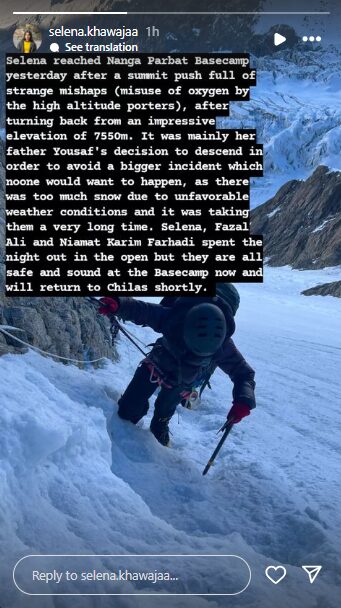
Selena Khawaja’s July 15 Instagram story.
